To address the topics of RIPE community health, the OSI Networking Model is mapped to the Maslow pyramid of needs. In this instalment of the series, Vesna Manojlovic connects Layer 6 and the aesthetic needs.
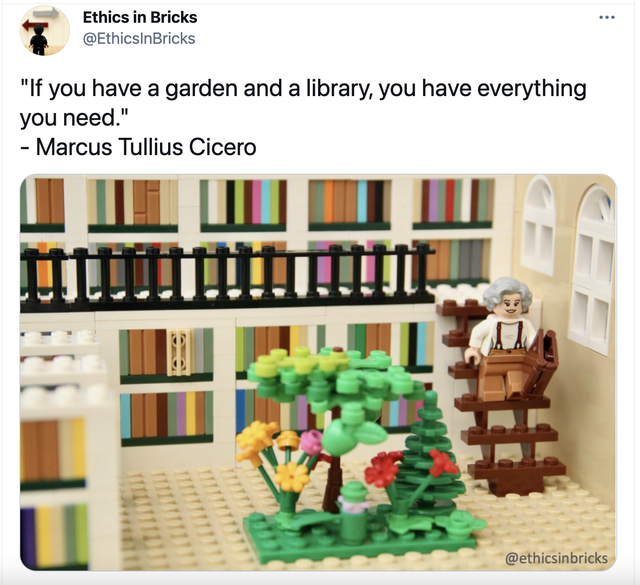
When the basic health and connection needs have been met, people have time and energy to fulfil needs for "self-actualisation". I have covered the five bottom layers in the previous articles. Layer 6 in the "Expanded Maslow's Hierarchy" is “Aesthetic Needs” (watch this video about Expanded Maslow's Hierarchy of Needs, Human Needs, Self Actualization, Humanistic Psychology) - and that's mapped to the Presentation Layer of the OSI Model.
If we consider one literal meaning of “presentation”: appearance, the Aesthetic Needs translate to Beauty. Beauty can be achieved though Art and through Nature.
"Art," in the sense of "living well, living with skill, grace, energy" - like carrying a basket of bread and smelling it and eating as you go. I don't mean only certain special products made by specially gifted people living in specially privileged garrets, studios, and ivory towers - "High" Art; I mean also all the low arts, the ones men don't want. For instance, the art of making order where people live. - "We Are Volcanoes": Ursula K. Le Guin, Bryn Mawr Commencement Address (1986)
“A walk in nature, walks the soul back home.” -1870, -- Mary Lua Adelia Davis Treat
Since there is so much material that I have collected about Art, Technology, Health, Nature (and Climate) - in connection to COVID-19 - I had to break it down further to multiple categories, AND I have limited myself to only three examples per category - and all from women! (Or collectives).
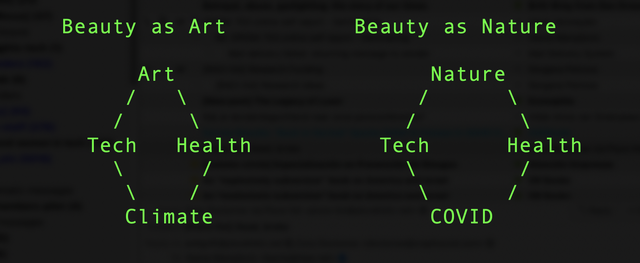
Art and Technology
Part of the Hackers' Ethics is a belief that computers can be used to create art and beauty in the world. At the Chaos Communication Congress (#CCC) every year there is a track of presentations dedicated to "Art and Culture", you can find them at: 34c3 , 35c3, 36c3, rc3. Here are some examples:
- Kat Austen: "Artistic interventions in climate change":Don't stop 'til you feel it (2017)
- "Augment cognitive and data derived knowledge with more emotionally connecting knowledges, to achieve a more integrated understanding of the world, and to once again embark on a quest for a type of truth.
- When we live close to the land we experience empathy with the land. It has recently been said that indeed our present mode of life has led to the “death of empathy”. The Coral Empathy Device...
- Maja Kuzmanovic of fo.am : "Art, Technology and The Cosmos" (March 2021)
- "The opening panel of the event on Art, AI and Everything Else, started with not knowing, ventured into augmented sociality, ancestral knowledge, corporate cyborgs, ecological intimacy and more."
- Annette LeMay Burke: "Fauxliage: Disguised Cell Towers of the American West" (2015-2020)
- "First created to decrease visual pollution and blend in with the environment, disguised cell phone towers have become an accepted yet contrived aesthetic in our neighborhoods and landscapes. I embarked on a series of road trips across the American West to document the variety of tower designs and to explore the question – how much of an ersatz landscape and manufactured nature are we willing to accept in exchange for quality cell service?"
- (An image of the mobile antennas in the palm trees in Palm Springs can be found further down in this article)
Technology and Climate
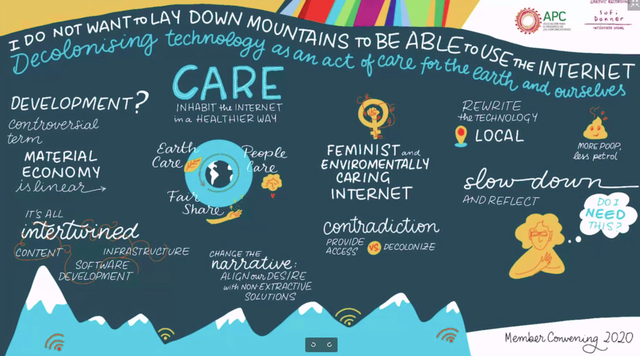
Technical communities are aware of the impact of technology on the planet's nature and climate change; we have covered the topic of sustainability previously on RIPE Labs; here are a few recent and relevant references (in the context of Layer 6)
- The Association for Progressive Communications (APC) at the IGF in 2020 addressed the theme “Internet for human resilience and solidarity” with the beautiful infographics above, including care, feminist Internet, decolonising technology, and slowing down - many my favourite topics!
- At RIPE 69, during the BoF on the Future of Technology, I gave my personal view about the impact of climate change on the future of the Internet, titled "Nature will have the Final Word"
- Dr. Kira Vinke "Climate Change and the Corona Pandemic" (CCC, December 2020)
Climate and (Mental) Health
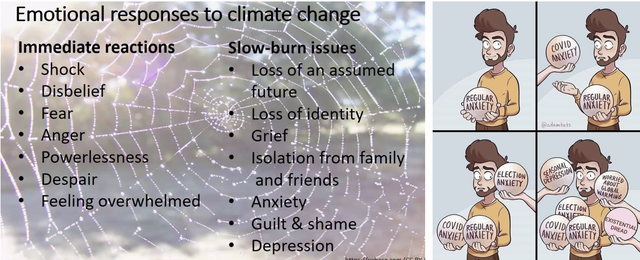
Physical and mental health are a basic layer of personal need fulfilment, and I wrote about this in the article about Layer 1. In the context of Nature, the climate change crisis has a negative impact on our health, and here are some recent examples:
- In the webinar series by the "Center for Alternative Technologies", in February 2021 psychotherapist and climate author Ro Randall talked about "Coping with the Climate Crisis". She explores the psychological effects of the climate crisis (anxiety, anger and grief), and ways we can support ourselves and others as we work towards a brighter future.
- Also in February 2021, author Britt Wray wrote about the "Therapy for the End of the World"in Walrus: Anxiety over the climate crisis is spreading like wildfire. Psychologists are just starting to figure out how to help.
- In January this year, ProPublica journalist Elizabeth Weil wrote about a climate scientist who spent years trying to get people to pay attention to the disaster ahead, and how has this impacted his mental health and his family: "The Climate Crisis Is Worse Than You Can Imagine. Here’s What Happens If You Try."
(Mental) Health and Art
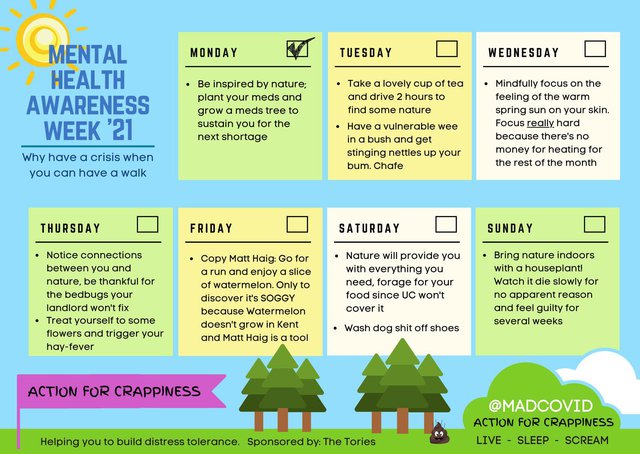
To continue on the previous topic -- if our health is impacted by the deterioration of nature and climate - or by COVID-19 - art can help:
- Britt Wray: Using art to process climate anxiety, grief and rage (April 2021)
- Smita James: “Being stuck at home made me realize: now is the time to go for what I want” quitting a job during pandemic to focus on art
- Northern Ireland Mental Health Arts Festival. 10-16 May 2021 (you can watch videos here)
Nature and Technology

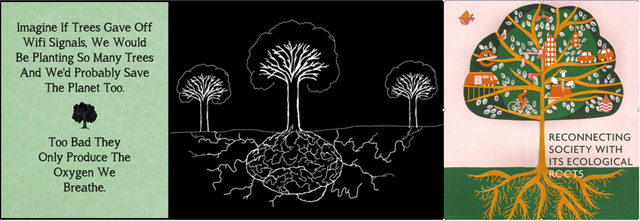
I'm using illustrations above to tell a story worth 1000 words: how the search towards technological progress in the Western societies has disconnected us from Nature; here are the scientific papers calling us to reconnect again:
- "Reconnecting society with its ecological roots", by The Institution of Environmental Sciences (August 2020) (image above)
- Radia Perlman at Campus Party Digital Edition, July 2020: "Can we survive with and without the internet?" (image above)
- Nature is fighting back! See this Wikipedia article about squirrel cyber-attacks, and my own collection.
COVID and Health
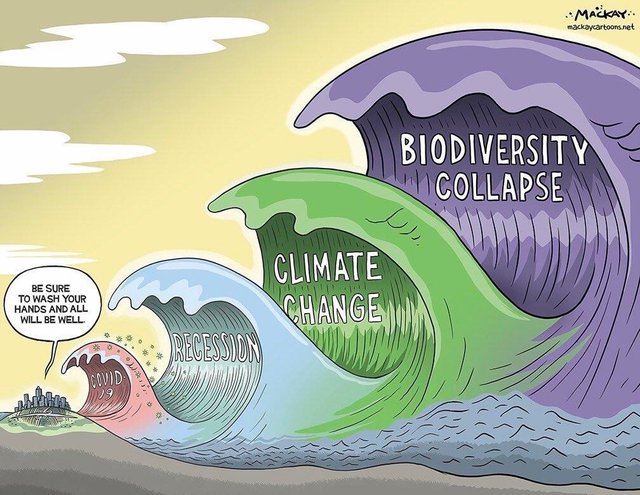
Right now, the COVID-19 crisis is the largest acute threat to health and wellbeing in the recent history; chronically - long-term, both in the past and in the future - climate change crisis is having even larger impact on our health.
Together, Climate Change and Corona Crisis form a "perfect storm". In the follow-up articles I will come back to this, and add economic crisis, inequalities, discriminations and other systemic causes - and how to stay resilient among all of them!
- Eva Horn: "Lockdown in Hell World" (February 2021)
- Lea Waters et.al.: "Positive psychology in a pandemic: buffering, bolstering, and building mental health" (Feb 2021)
- Farhana Sultana: "Climate change, COVID-19, and the co-production of injustices: a feminist reading of overlapping crises" (April 2021)
Health and Nature
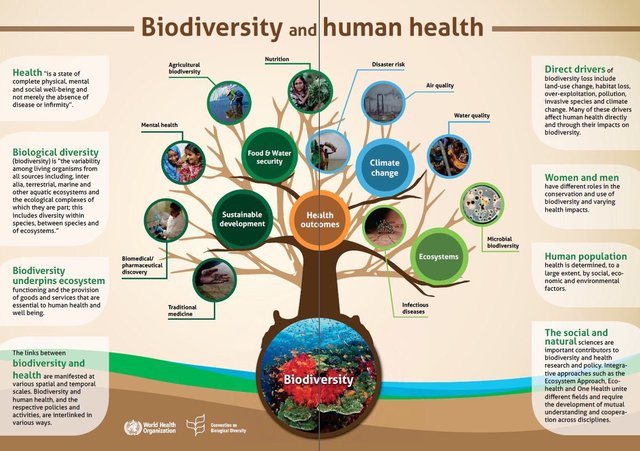
- "Nature is our Greatest Source of Health and Well-Being": World Health Organisation (WHO), June 2020
- "How connecting with nature benefits our mental health": Mental Health Foundation, UK (April 2021)
- In this webinar from CAT, Kim Stoddart guides us through what we can do in our gardens or community green spaces to build resilience, boost biodiversity and help nature thrive. Kim introduces us to the principles of climate change savvy gardening, focusing on how nature often holds the answer. (November 2020) (screenshot below)
Personally, during this pandemic, my health has benefited from being in contact with nature: both outside, during the walks, in the house, by tending my plants (photo below) and playing with my cat Mračak.

Calls to Action
Attend Art and Tech Events
- The Culture Health and Wellbeing International Conference 2021 (21/06/21 to 25/06/21)
- Mad Hearts: The Arts and Mental Health - School of English and Drama (10-11 June 2021, online)
- Carnival of Trees, online & live in Tooting (UK), (10 July 2021)
- The New Herulians: The Technology of Emotions (30th June 2021)
Cultivate Your Own Garden
Join Youth Activists
- Join Extinction Rebellion! rebellion.global
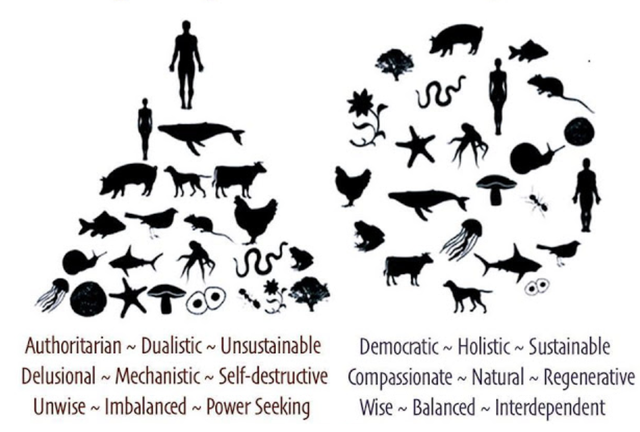
Bonus Links
- "Reconnecting with Nature: Developing urban spaces in the age of climate change", by Steffen Lehmann (in Geoscience, 2019)
- Aesthetic of uncivilization, Charlotte Du Cann (2013)
- The president of Ireland invited the engineers to focus on climate action, in his speech at the Engineers Ireland annual conference on 21 October 2020: “Climate Action and the Role of Engineers”
- EXTRACTION: Art on the Edge of the Abyss, a multimedia, multi-venue, cross-border art intervention that seeks to provoke societal change by exposing and interrogating the negative social and environmental consequences of industrialized natural resource extraction.
- "On Earth – Imaging, Technology and the Natural World", exhibition by FOAM, 20 March - 2 September 2020
- Demo scene: demoscene-the-art-of-coding.net was added to the UNESCO list of intangible cultural heritage.in Finland (April 2020) and in Germany (March 2021) .
- https://criticalengineering.org : Critical Engineering Manifesto
- WIRED: "How Pixar Uses Hyper-Colors to Hack Your Brain"
- Biodiversity data as public environmental media, by Mitchell Whitelaw (March 2021)
- Covid impact on mental health:The year your therapist broke down (21 May 21)
- It's OK to have Climate Anxiety, by Eric Holthaus (April 2021)
- Rasha Shraim’s education helped her to think more deeply about ethics, logic and other big questions:How philosophy is making me a better scientist?
- No Planet B: A Teen Vogue Guide to the Climate Crisis
- Culture as a cure ? exploring links between arts and health | London City Hall (November 2020)
- Art & Theory Collection, free e-book aesthetics of the commons
- The bad environmentalism of ‘nature is healing’ memes, by Kai Bosworth (April 2021)
- Principles for Staying a Beautiful, Wise, and Loving Person in a Time of Crisis and Collapse, by umair haque (May 2021)
- “From anger to action: Differential impacts of eco-anxiety, eco-depression, and eco-anger on climate action and wellbeing”, by Samantha K.Stanley, Teaghan L.Hogg, Zoe Leviston, Iain Walker
- “Do Artefacts Have Politics?” , by Langdon Winner (1980)
- Viewing art about nature can improve mental health! "Autonomic Nervous System Responses to Viewing Green and Built Settings: Differentiating Between Sympathetic and Parasympathetic Activity", by Magdalena M.H.E. van den Berg et.al.
- A celebration of the arts, mental health and wellbeing: BEDLAM Arts and Mental Health Festival 2019
- Mental Health Awareness Week, & The Guide to Thriving with Nature, Mental Health UK
- Rachel Carson and the Culture-Shifting Courage to Speak Inconvenient Truth to Power: The Writing of “Silent Spring”
- “There is something infinitely healing in the repeated refrains of nature – the assurance that dawn comes after night & spring after winter.” —Rachel Carson
- Capitalism’s Not Going to Save the Planet, Us, or Life on It, umair haque (April 2021)
- The Fight Against Environmental Breakdown: Beyond the Ruins, Edited by Verso Books (free eBook) (May 2021)
- Neorural Futures: A documented case history of a Speculative Design learning experience in Rome
- Book: Sustainability and Wellbeing: Human-Scale Development in Practice, By Mònica Guillen-Royo (2016)
- On Climate as the Dominant Meme, by G. Bateson / @seasonalight (May 2021)
- Collection of articles from the "Rest of the World": Year of the Pandemic
- Reconnecting society with its ecological roots, by (in Environmental Science, February 2021)
- "To Stop Biodiversity Collapse Humanity must reconcile with nature", by Bergensia, (December 2020)
- After the lockdown? New lessons for building climate change engagement in the UK - Climate Outreach
- Rewilding the Human Biome: A Conversation with Jamie Larimer
- Caitlin Johnstone: We're All Weird Naked Murder Monkeys (April 2021)
- "Our minds are touching right now by virtue of an internet that is responsible for 3.7 percent of global greenhouse emissions, using expensive gadgets built by human beings who've had to work far too hard for far too little in return. Our entire lives are at this very moment interwoven with the suffering of other sentient beings. Inseparably so. Our whole lifestyle is wrapped around an infrastructure of suffering and death."
- Paratext-52: Digital PTSD: Art by Hangar.org
- Living Planet Index: what does an average decline of 68% in BIODIVERSITY really mean? - Our World in Data (May 2021)
- Could Climate Change be More Extreme Than We Think? (March 2021)
- Learning from the Main Report by The Independent Panel for Pandemic Preparedness and Response (May 2021)
- Covid poses 'greatest threat to mental health since second world war', in The Guardian (December 2020)
- If the pandemic has taught us anything, it’s that we cannot ignore the warning signs for future catastrophes. // Ransomware Attacks Are Only Going to Get Worse - The Atlantic (May 2021)
- Research on how simulation gaming can be used to experiment with new ways of organising sustainable future societies, by Joost Vervoort & @anticiplay
- From Egoism to Ecoism: Psychedelics Increase Nature Relatedness in a State-Mediated and Context-Dependent Manner (2019)
- Richard Louv is an author and journalist who has written many books on the healing power of nature including ‘Last Child in the Woods’, ‘The Nature Principle’ and ‘Vitamin N: The Essential Guide to a Nature-Rich Life’. He coined the term ‘nature-deficit disorder‘, which he uses to explain the various psychological and physiological health issues (including obesity, lack of creativity, depression etc.) children/adults suffer from because of a lack of connection with nature.
- My collection of links about trees (2013-202x)
Ask yourself:
Could this meeting be a zoom?
Could this zoom be a phone call?
Could this phone call be an email?
Could this email be a text?
Could this text be unsent?
Could we in silence retreat to the forest?
Could we, by game trails & forgotten paths, vanish into the trees?


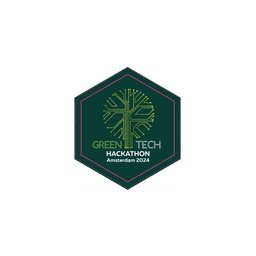
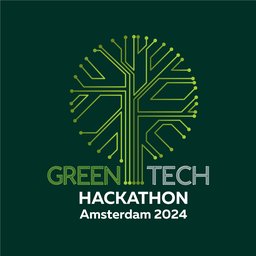
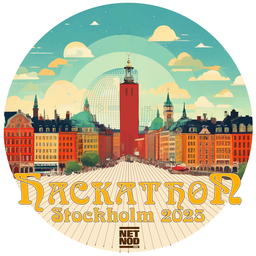
Comments 0
The comments section is closed for articles published more than a year ago. If you'd like to inform us of any issues, please contact us.